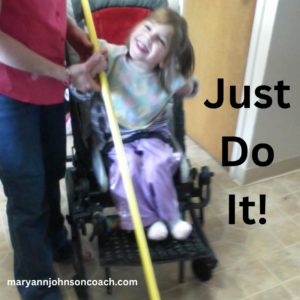 Back in 2013, when Jodie and her family moved into our three-bedroom apartment while looking for a new home, I was reminded of many things I had forgotten since my children had grown up and moved away. It takes flexibility to manage a family. Things don’t always go the way you plan, and moving forward when things aren’t just what you want, well, that is the road to feeling good as a family. Here is a peek back to that ‘learning’ time. By the way, Jodie was homeschooling Maggie and Jack and bringing Mary on board. It was a big load!
Back in 2013, when Jodie and her family moved into our three-bedroom apartment while looking for a new home, I was reminded of many things I had forgotten since my children had grown up and moved away. It takes flexibility to manage a family. Things don’t always go the way you plan, and moving forward when things aren’t just what you want, well, that is the road to feeling good as a family. Here is a peek back to that ‘learning’ time. By the way, Jodie was homeschooling Maggie and Jack and bringing Mary on board. It was a big load!
What does ‘Just Do It’ look like?
There are some real advantages to having a family of six move in with you, especially if they have four children, six and under. I have gotten a bird’s eye view reminder of what it is REALLY like to parent, and home educate. I have been thinking back to my own days of doing both these things, and this has brought back memories, some good and some bad.
Today was a particularly interesting and REAL day. I had to share. It was an example of what “just do it” means in a family.
I heard the children at about 6:30, but I didn’t get up until after 7:00. It was quiet in the living room with Jodie busily working on her computer while the children watched a movie around her. That is how Jodie gets her own devotional and study time accomplished from 6:30 to 8:00. The movie is essential. We all know that watching a movie isn’t the best way to occupy children, but you do what you can, right?
Breakfast happens in shifts as each child awakes. It takes about an hour to feed Maggie, the six-year-old with CP, so Jodie often does that while she reads her scriptures or plans the day. If all goes well, and today it did, everyone is happy, it feels peaceful, and all are fed by 8:00 or so.
I might mention that on some days, one or more children have two breakfasts because by the time the first wakes till the last awakens, or Jodie has time to get food to each one, several hours can go by. By then, early risers are ready for breakfast number two. In fact, I had forgotten how often you must stop and get food for someone in this age group! No matter how your morning goes, as you move towards learning time, you keep going.
On mornings when it all doesn’t go as smoothly as today, it might be 10:00 before everyone is fed and dressed. Those are the noisy and sometimes exhausting mornings. You just keep smiling, hugging, and remembering that this too, will pass. It doesn’t matter if school begins later if it happens.
‘Just do it’ keeps everything moving when it’s not perfect!
Next, it’s getting ready for the day, taking off pajamas and getting dressed, changing diapers. This is less peaceful and usually goes less smoothly; you know how it is. One child doesn’t like what you have given them to wear, another doesn’t want their diaper changed, a third won’t hold still long enough to get dressed, and all the while Maggie, is asking for her iPad with a loud “Where are you” squeal.
Then we move to the family devotional. Quiet reverence is not the standard here. There is family singing with one voice, Jodie’s. Then a lot of “sit down, fold your arms, can you listen please” and sighing…on mom’s part. As I watch and occasionally participate, I sometimes think that I would bag it and move on. Jodie is a stalwart for sure. She is a master of ‘just do it.’
By about 10:15 today all was finally accomplished. Jodie had showered and dressed. (How she got a shower I am not quite sure!) Next, it was family work. Family work is never called chores. It isn’t a chore to do your part in your family. Chores are saved for consequences when you forget to do as asked in a pleasant way, which on some days can be often! : )
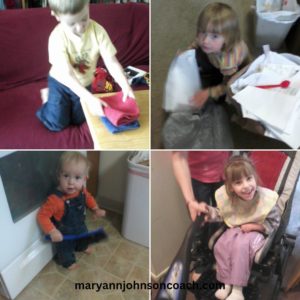 Family chores are one way that Jodie helps the children gain confidence and pride in their abilities. Jack was supposed to fold clothes. I saw Jodie pull folded dishcloths out of the drawer, unfold them, and give them to Jack to fold. (He didn’t see her unfold them.) This happened because there wasn’t any clean laundry to fold. It wasn’t that there wasn’t any laundry; it was just all still dirty. Often laundry takes a back seat to what really matters. : )
Family chores are one way that Jodie helps the children gain confidence and pride in their abilities. Jack was supposed to fold clothes. I saw Jodie pull folded dishcloths out of the drawer, unfold them, and give them to Jack to fold. (He didn’t see her unfold them.) This happened because there wasn’t any clean laundry to fold. It wasn’t that there wasn’t any laundry; it was just all still dirty. Often laundry takes a back seat to what really matters. : )
Mary was assigned to empty wastebaskets while Benny carried his little broom around copying the Bigs in his life. Maggie swept and vacuumed, and she loves helping. It will always be a special treat to her because it is never mundane.
After family work, it was school. Today, they read the classic they are working on, “Raggedy Ann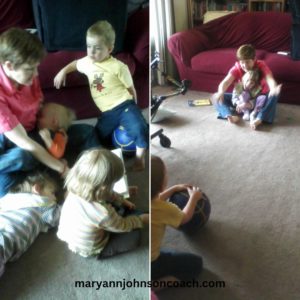 and Andy”. Then they played ball. Maggie needs help with this activity. Jack is a great big brother and did his part. Then we made hedgehogs.
and Andy”. Then they played ball. Maggie needs help with this activity. Jack is a great big brother and did his part. Then we made hedgehogs.
A few days earlier, I was telling the kids about hedgehogs. We looked at pictures and videos online and they were so taken with them. Today, out of the blue, Jack asked to make a hedgehog!
His mom didn’t put him off so that she could find a pattern and get the stuff needed. She just threw some odds and ends together. She used what she had because the interest was now. In a day or two it would probably be gone. Sparks, or what interest a child, can have a short shelf life. The younger the child the shorter the shelf life. : )
 I was so busy helping that I didn’t get a photo of the table before the project began. I would have loved for you to see it. It was a disaster. Most of what we used for dinner was still there from the night before. I am sorry to have to confess that, but there it is. Some nights we move on to something else right after the meal and often, well, we are tired. : ) Jodie did what any great mom would do. She pushed it out of the way and carried on.
I was so busy helping that I didn’t get a photo of the table before the project began. I would have loved for you to see it. It was a disaster. Most of what we used for dinner was still there from the night before. I am sorry to have to confess that, but there it is. Some nights we move on to something else right after the meal and often, well, we are tired. : ) Jodie did what any great mom would do. She pushed it out of the way and carried on.
Here, in a borrowed home, in cramped quarters, that was all of it, all there was to “school” and taking care of ‘family time.’ There are thoughts in both our minds, mine, and Jodie’s, about what a successful home education and family-together day should look like. This is what it looks like for now.
Instead of requiring everything to be ‘just right’ before you move forward, decide instead to ‘just do it!’

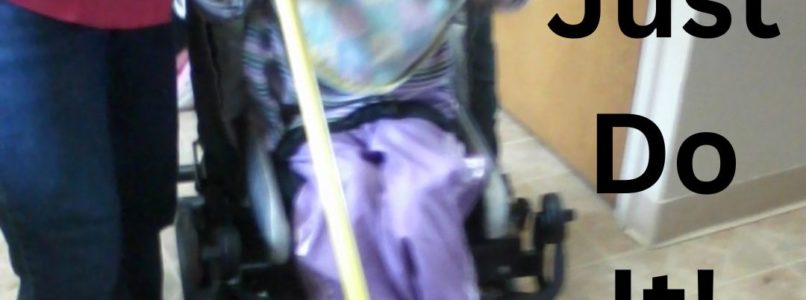
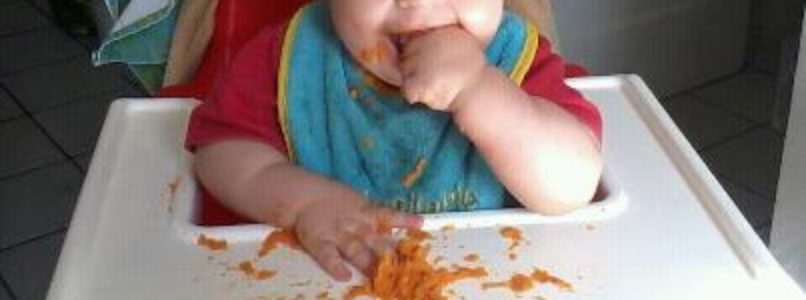
 When we moved from Montana to Utah we helped our daughter purchase her first home. We lived in that home with her for a while. Then she married, and we moved two blocks away. Not long after that Maggie, our granddaughter with CP, was born.
When we moved from Montana to Utah we helped our daughter purchase her first home. We lived in that home with her for a while. Then she married, and we moved two blocks away. Not long after that Maggie, our granddaughter with CP, was born. see what was up. He was running his trucks through the maze laid out in a random pattern on practically every square inch of the living room floor. All’s well here, back to the “jelly” sauce.
see what was up. He was running his trucks through the maze laid out in a random pattern on practically every square inch of the living room floor. All’s well here, back to the “jelly” sauce.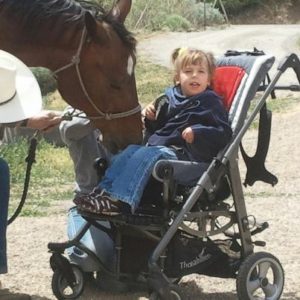 Meanwhile, the six-year-old was yelling for help with her iPad. Maggie has cerebral palsy and has a way of letting us all know when her iPad is not cooperating with her limited hand movement. Right now, she was letting me know…loudly.
Meanwhile, the six-year-old was yelling for help with her iPad. Maggie has cerebral palsy and has a way of letting us all know when her iPad is not cooperating with her limited hand movement. Right now, she was letting me know…loudly.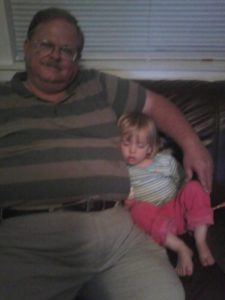 I holler to Jack, “Go tell Grandpa that grandma needs him…NOW!” I am 63 with a 64-year-old husband and three years ago our youngest child got married and left home. This was after 39 years of in-house parenting.
I holler to Jack, “Go tell Grandpa that grandma needs him…NOW!” I am 63 with a 64-year-old husband and three years ago our youngest child got married and left home. This was after 39 years of in-house parenting.
 In the next four weeks, I am going to be sharing articles I wrote over ten years ago. Why? Because they were fun, contained great information and when I reread them, I fell in love with my family all over again. I will have a current introduction to each article, but I‘m not going to adjust the information to make it appear that it is in the now. You will see people and situations as they were over a decade ago.
In the next four weeks, I am going to be sharing articles I wrote over ten years ago. Why? Because they were fun, contained great information and when I reread them, I fell in love with my family all over again. I will have a current introduction to each article, but I‘m not going to adjust the information to make it appear that it is in the now. You will see people and situations as they were over a decade ago.
 When I woke up that bright and sunny morning, I never suspected that I’d burn down my bedroom. But some days just don’t go as planned.
When I woke up that bright and sunny morning, I never suspected that I’d burn down my bedroom. But some days just don’t go as planned.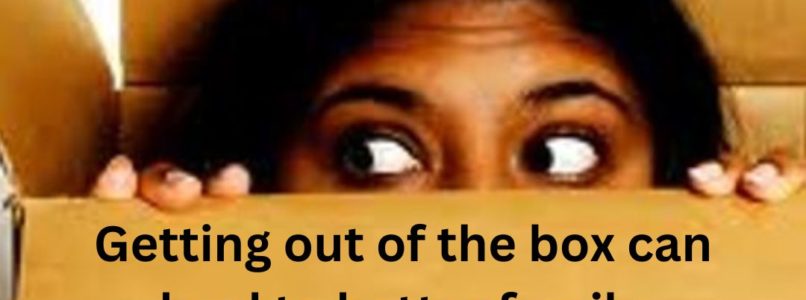
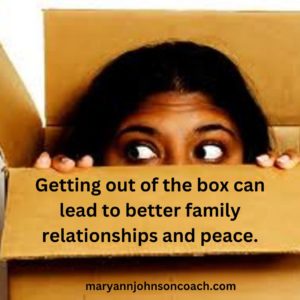

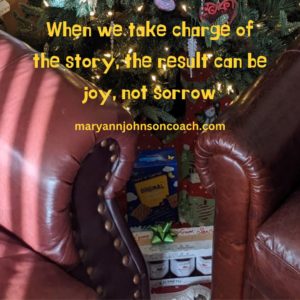

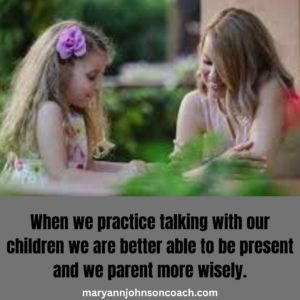 6 Tips for Talking With Kids
6 Tips for Talking With Kids
 In September, I took a rest. I had traveled to Colorado in late August to help a daughter having surgery and was repeating that trip for the same reason early in September. I knew I was going to
In September, I took a rest. I had traveled to Colorado in late August to help a daughter having surgery and was repeating that trip for the same reason early in September. I knew I was going to 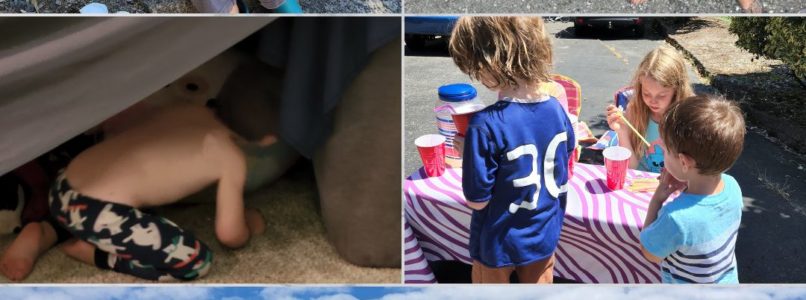
 I was not a perfect parent! Of course, you know that because there are no perfect parents, any more than perfect people. However, it shocks me when I see a poor behavior from my parenting days that has crept into my grandparenting days. Being with children is like being under a microscope, where your strengths and weaknesses are enlarged for you to view.
I was not a perfect parent! Of course, you know that because there are no perfect parents, any more than perfect people. However, it shocks me when I see a poor behavior from my parenting days that has crept into my grandparenting days. Being with children is like being under a microscope, where your strengths and weaknesses are enlarged for you to view.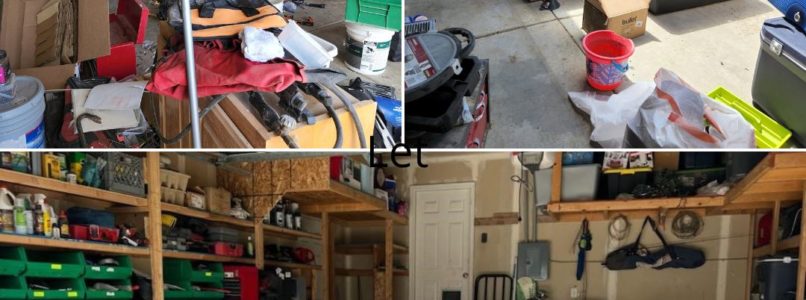
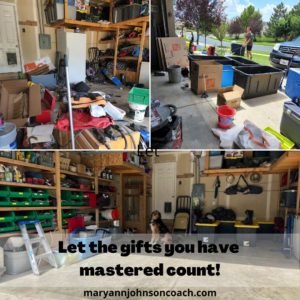 Yesterday, after an hour’s drive, I spent the day helping a friend clean and organize her garage. Wow, it was a hot day, punctuated by a downpour, in the afternoon. I got to work with her sons which was a treat. They did good. : )
Yesterday, after an hour’s drive, I spent the day helping a friend clean and organize her garage. Wow, it was a hot day, punctuated by a downpour, in the afternoon. I got to work with her sons which was a treat. They did good. : )